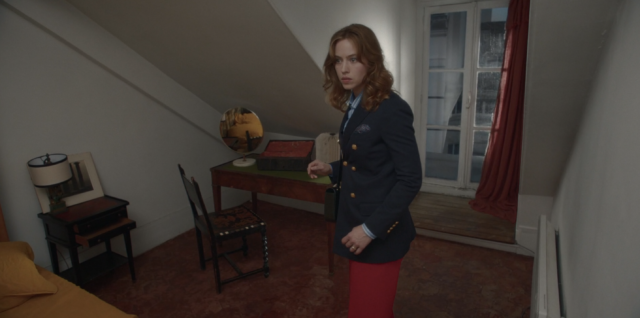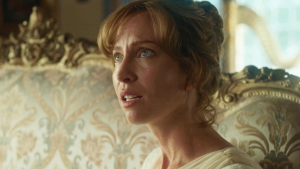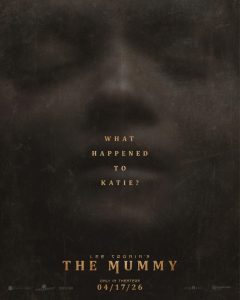
The post Coup de Chance: Write Your Ending, by Scott Nye appeared first on Battleship Pretension.
Coup de Chance is Woody Allen’s 50th, and potentially final, theatrical film, and one would hardly say his most original. Revisiting themes of luck, misfortune, guilt, and violence, comparisons to Crimes and Misdemeanors, Irrational Man, Match Point, Cassandra’s Dream, and more come faster than the banter in his comedies. That it’s his most dramatically satisfying film since 2016’s Café Society might have less to do with its particular merits, which run the gamut between intriguingly modest and fleetingly captivating, and more to do with the abject sluggishness of his work since then.
Where it does raise an eyebrow is that it marks his first film in a foreign language. Faced with increasingly insurmountable difficulty raising money for something in English following increasingly-explosive reporting on his sexual abuse allegations over the past six years, he has, as many before him, fled to France, this time not to make a starry tourist call (as with 2011’s Midnight in Paris), but to make something that could very well have come from its own industry.
Lou de Laâge (The Innocents, The Mad Women’s Ball) stars as Fanny, an employee at an Parisian auction house. In the film’s arresting three-minute opening shot, she runs into Alain (Niels Schneider), a friend from college. He is attractive, charming, immediately in love with her, and works as a writer in a small loft. She, however, is married, devotedly so, though her husband Jean (Melvil Poupaud) can be jealous, controlling, and often regards her as a possession more than a partner. What follows involves an affair, a detective, a disappearance, suspicions, and, yes, quite a bit of welcome happenstance.
If narrative economy was a particular strength he honed over the years, his recent work has suffered from a devotion to it. Coup de Chance doesn’t feel rushed – it feels hollowed out. Where his late period bloom (particularly from Midnight in Paris to Café Society) was marked by greater appreciation for the beauty of cities, seas, nights, and lighting (thanks in part to an immensely fruitful collaboration with cinematographer Darius Khondji, who shot four of his six films in that period), his final stage has turned ruthlessly strict, morosely circling the themes and story structures that made his career, with only occasional hints at the inspiration that once rang so true (the ending of Rifkin’s Festival, a dreadful movie, is one of his most open, incisive, and brilliant bits).
Coup de Chance largely follows the expected beats, with the language barrier providing all the more resistance towards his conversational flights of fancy. Allen remains as brilliant at blocking actors in a shot as anyone in his generation (nearly all of whom are leagues ahead of contemporary image-focused filmmakers), though Vittorio Storaro’s ever-unusual cinematography creates as many aggressively off putting images as it does fetching ones.
It is the cast, particularly the three main actors, who are its best and most engaging asset. Poupaud is unusually prickly, Jean being a man with so many thorns in his side they’re protruding into others’ as well, and runs into danger of going too broad, but manages to convey the most subtle form of it. Schneider is wonderful, pretty as ever and selling the fantasy Alain represents with humor and vulnerability.
I’ve been following Lou de Laâge’s career (as closely as one can from the States) for the past ten years, since she made a striking impression in 2014’s Breathe, and have yet to see her tell anything less than the truth onscreen. Fanny is the most manipulated, deluded character in the film, but de Laâge finds strength and singular resolve amidst her weakness, turning what could in another actress’s hands be a too-clueless character into one who’s sure of what she needs to do, just has a habit of talking herself out of it. That’s a very delicate interior dynamic to play that Allen’s impatient direction doesn’t make space to highlight, yet she nevertheless seizes it. Costume designer Sonia Grande, a frequent collaborator for Allen as well as Pedro Almodovar, crafts for Fanny somewhat old-fashioned professional suits (Allen’s lookbook is eternally a throwback) that help her craft a distinct physicality and spotlight the space she assumes in every scene, even when Fanny would rather disappear.
Rifkin’s Festival, for all its drudgery, suggested a more natural conclusion to Allen’s career. Here, he instead goes out with a competently- and occasionally-masterful version of a type of film not only he’s made before, but numerous French filmmakers (ranging from Claude Chabrol to François Truffaut to François Ozon) have done so just as successfully and often moreso. It is good, though not so good as to draw a strong recommendation (certainly not above and beyond any personal distaste viewers might have for the man), hardly so notable in the context of his career as to warrant exceptional inclusion in a survey of it, nor so much more distinct or compelling than reams of other French thrillers. It satisfies those of us with a penchant for these things, without stoking anything particularly its own. For decades, Allen made a film nearly every year, but could hardly be said to have churned out routine programmers; now, he just may have.
The post Coup de Chance: Write Your Ending, by Scott Nye first appeared on Battleship Pretension.
The post Coup de Chance: Write Your Ending, by Scott Nye appeared first on Battleship Pretension.






